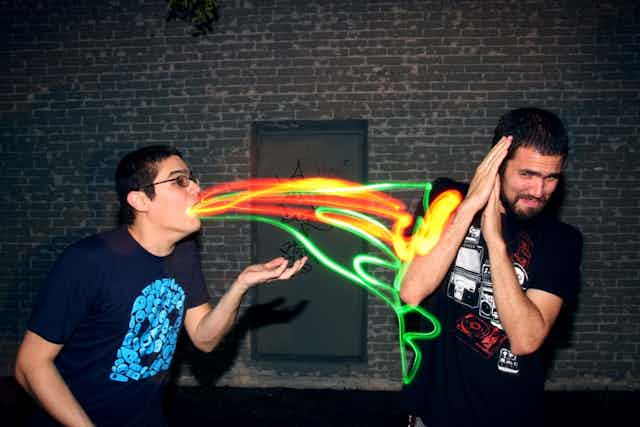If you feel slightly nauseated while using your iPhone or iPad, you’re not alone: you join a number of people reporting that the zooming, sliding and 3D effects of Apple’s new mobile operating system - iOS 7 - is a little too dynamic for their liking, giving them motion sickness.
Complaints on various forums include:
I thought I was going crazy today after I updated my phone and I noticed I was feeling queasy every time I used it. Now I see I am not alone! I just used my phone for about 20 minutes and now I feel like I’m going to vomit.
I’m now going on day three of total nausea. At first I didn’t want to believe it’s because of iOS 7, but I can’t stand even looking at non animation areas for more than a few minutes even typing this.
The physical consequence of using iOS 7 is a really good example of how mobile technologies and virtual worlds bring a number of interesting effects to the average user - and unfortunately for us, the repercussions are very real.
Simulator sickness
Simulator sickness is an acute condition of medical distress that happens in exposure to virtual environments. It starts as stomach discomfort, bodily warmth, headache, dizziness and/ or drowsiness, then proceeds to stomach distress, nausea and vomiting.
This is caused by a phenomenon called vection. Vection is the perception of self-motion (while being stationary) induced by a moving visual scene, resulting in a sensory conflict.
A common technique in vection research is the optokinetic drum - a black and white striped cylinder which rotates around a seated, stationary subject.
Two forms of vection are commonly investigated:
- Circular vection: the illusion of rotation
- Linear vection: the illusion of travelling in a straight path.
In humans, movement through the environment is inferred by three principal sensory systems:

- vision
- the two components of the vestibular system in the inner ear - the semicircular canal system, which detects rotational movements, and the otolith organ (comprising the saccule and utricle structures) which detects linear acceleration.
It is now widely accepted that motion sickness is caused by conflicting inputs between the visual and vestibular systems, or between the two vestibular systems, and comparison of those inputs with the individual’s expectations derived from previous experience.
Resolving (sensory) conflict
There are a number of factors which may contribute to causing or alleviating simulator sickness:
- High frequency eye movements: Alternative theories have suggested that motion sickness may arise from eye movements. Higher frequency eye movements (where a subject’s eyes flick back and forth quickly) increase motion sickness in response to an optokinetic drum.
Motion sickness can been reduced with fixation, where subjects focus on a stationary object in front of the moving stripes, preventing eye movements. This is comparable to fixating on the horizon while travelling in a moving car to decrease the effects of carsickness. But there are other researchers stating that vection is controlled mainly by peripheral image motion and is unrelated to eye movements.

- Habituation: Habituation occurs when people are repeatedly exposed to virtual scenes, or over several days or weeks, and report less simulator sickness along those exposures.
Some researchers noticed that many “older” people appeared to suffer from effects of motion sickness while most “younger” people showed few or no effects from their experience. Familiarity with computer games may be an advantage to obtain habituation, especially in younger generations.
Being familiar with 3D simulations, even in non-stereoscopic (single eye) situations, could produce habituation to computer graphics contents, and thus result in less simulation sickness.
Motion prediction: There are other experiments which attempted to minimise the effect of simulator sickness in virtual reality by incorporating motion prediction, in which the user is able to tell where the camera will move to next, or stating that visual cues (such as the horizon) are necessary among other factors to suppress simulator sickness.
Depth perception: The ability to judge distance accurately is essential to many real-world tasks, including navigation, aiming, and shooting. Studies of direct comparisons of verbal distance estimates in virtual environments and real environments suggest that observers are less accurate in estimating distance in the virtual than in the real world.

- Disorientation and head tracking: while there are many algorithms and techniques developed for head tracking, such as sensors that allow changes of angle and orientation to be recorded on head-mounted displays, inaccuracy of head tracking might be a major reason for disorientation.
It is important to investigate whether disorientation effects might be alleviated if a person has full freedom of movement, and has his or her hands present, in the virtual world.
Still queasy?
Improvements in mobile technology within the past decade suggest an increased need for more current device comparisons, as well as comparisons between simulator configurations and simulator sickness results.
We should not only investigate the impacts of the hardware, but also the quality and content of software as well - especially the accuracy of head tracking and navigation and processing of content - which may have serious impacts on human perception and cognition.
In the meantime, if the parallax effect of iOS 7 continues to turn your stomach (and you have an iPhone 5) you could always try the “Reduce Motion” option under “Accessibility”.
But if you’ve an iPhone 4S or older, better hope you habituate - or resort to what others have done: downgrade to iOS 6.

